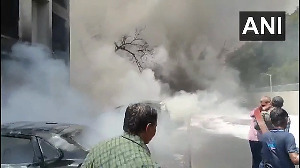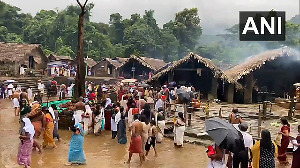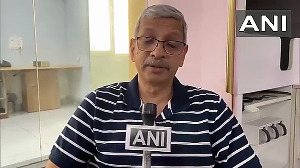Prime Minister Narendra Modi on Sunday made a renewed push for expansion of the United Nations Security Council and reforms in all global institutions to reflect world's 'new realities', as the G20 summit drew to a close with the United States, Russia and France praising the meeting outcomes under Indian presidency.

Marking the ceremonial transfer of the rotational G20 presidency, Prime Minister Modi handed over the gavel to Brazilian President Luiz Inacio Lula da Silva, who hailed India for giving voice to topics of interests of emerging economies.
Lula also said the UNSC needs new developing countries as permanent and non-permanent members to regain political strength and greater representation for emerging countries at the World Bank and the IMF.
"In his concluding remarks at the final session of the two-day G20 summit, the prime minister also proposed a virtual session of the G20 around the end of November to take stock of the suggestions and decisions made by the leaders of the major developed and developing countries in New Delhi.
The 55-country African Union was also granted permanent membership on Saturday in a milestone for India's presidency.
"With this(proposal), I declare the G20 summit as closed," Modi said.
Modi, who noted that India's presidency of G20 would officially continue till November 30 and that over two-and-half months were left for its tenure as the head of the grouping, cited a Sanskrit shloka to pray for hope and peace in the entire world.
Official sources, meanwhile, said the text relating to Russia-Ukraine conflict in the New Delhi Leaders' Declaration is a 'convergent consensus' rather than a 'divisive consensus' and it could show a path to resolution of the crisis, a day after a breakthrough on the contentious issue was achieved to help the G20 leaders come out with a 37-page Declaration marking a huge diplomatic win for India.
India achieved '100 per cent' consensus on developmental and geo-political issues in the Declaration, which avoided mentioning the Russian invasion of Ukraine and made a general call to all states to follow the principle of respecting each other's territorial integrity and sovereignty.
US President Joe Biden said the New Delhi summit has proven that the grouping can still drive solutions to its most pressing issues.
He made the remarks in a post on X as he left for Vietnam after he and several other G20 leaders paid homage at Mahatma Gandhi's memorial Rajghat in the morning.
"At a moment when the global economy is suffering from the overlapping shocks of the climate crisis, fragility, and conflict, this year's Summit proved that the G20 can still drive solutions to our most pressing issues," Biden said.
Russian Foreign Minister Sergey Lavrov said the G20 Summit under India's presidency was a 'breakthrough' conclave in many ways as its outcomes showed a path to the world to move forward on a range of challenges and demonstrated the strength and importance of the Global South.
After a luncheon meeting with Prime Minister Modi, French President Emmanuel Macron told reporters that considering the current fragmented environment, India has done well as G20 president.
Addressing the 'One Future' session at the summit, Modi said it is necessary the global bodies should reflect the 'new realities' to lead the world towards a better future.
"In order to take the world towards a better future, it is necessary that the global systems are according to the present realities. Today, the 'United Nations Security Council' is also an example of this. When the UN was established, the world was completely different from what it is today. At that time there were 51 founding members in the UN. Today the number of countries included in the UN is around 200," Modi said.
"Despite this, the number of permanent members in the UNSC remains the same. The world has since changed a lot in every aspect. Be it transport, communication, health and education, every sector has been transformed. These new realities should reflect in our new global structure."
The UNSC has five permanent members--the US, China, France, Britain and Russia.
Pitching for reforms, he said that is why a historic initiative was made on Saturday by granting the 55-nation African Union(AU) permanent membership of the G20.
"Similarly, we also need to expand the mandate of multilateral development banks. Our decisions in this direction should be immediate and effective," said Modi, who also led G20 leaders in a symbolic tree plantation ceremony at the swanky convention centre Bharat Mandapam to mark the 18th summit of the grouping which was established after the 1999 Asian financial crisis.
Modi described cyber security and crypto currencies as among the burning issues affecting the present and future of the world.
The crypto currency is a new subject for social order, and monetary and financial stability, he said, seeking the development of global standards to regulate it.
Cyber space has emerged as a new source of funding for terrorism and global cooperation and framework are necessary for securing it, he said.
"This is a very important subject for every country's security and prosperity."
"When we take care of the security and sensitivity of every country, then the feeling of 'One Future' will be strengthened," he added.
He said the world needs to go beyond the concept of 'global village' to make 'global family' a reality, calling for a future in which not only the interests of the countries are aligned but also are their the hearts.
At his press briefing, Lavrov said India played an important role in 'preventing the West' from taking forward their approach on many issues, including Ukraine.
"It is a breakthrough summit in many ways. It provides us a way forward to move ahead in many issues."
Lavrov also noted that the Delhi summit provided a direction towards fairness in global governance and global finance as well.
"I want to express my gratitude to India for preventing attempts to politicise the G20," he said, adding the West will not be able to remain a "hegemony" as we see new centres of power coming up in the world.
Addressing the closing ceremony, President Lula said geopolitical issues should not hijack the discussions at G2O and that the bloc was not interested in a 'divided G20' and the challenges of the day could be faced only through joint action.
"We need peace and cooperation instead of conflict," he said. The next summit will be held in Rio de Janeiro in November 2024.
"The path that will take us from New Delhi to Rio de Janeiro will require lot of dedication and commitment from everyone," Lula said.











